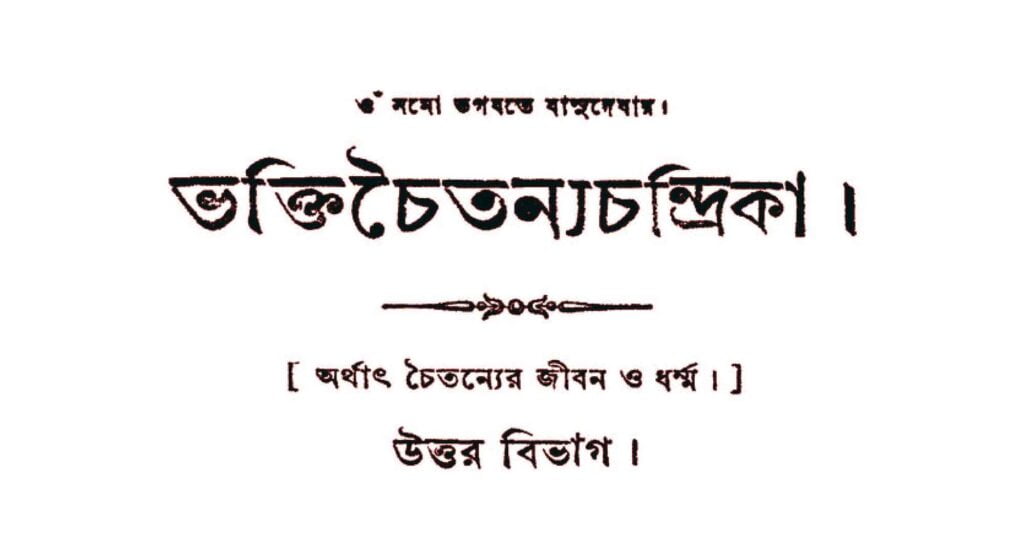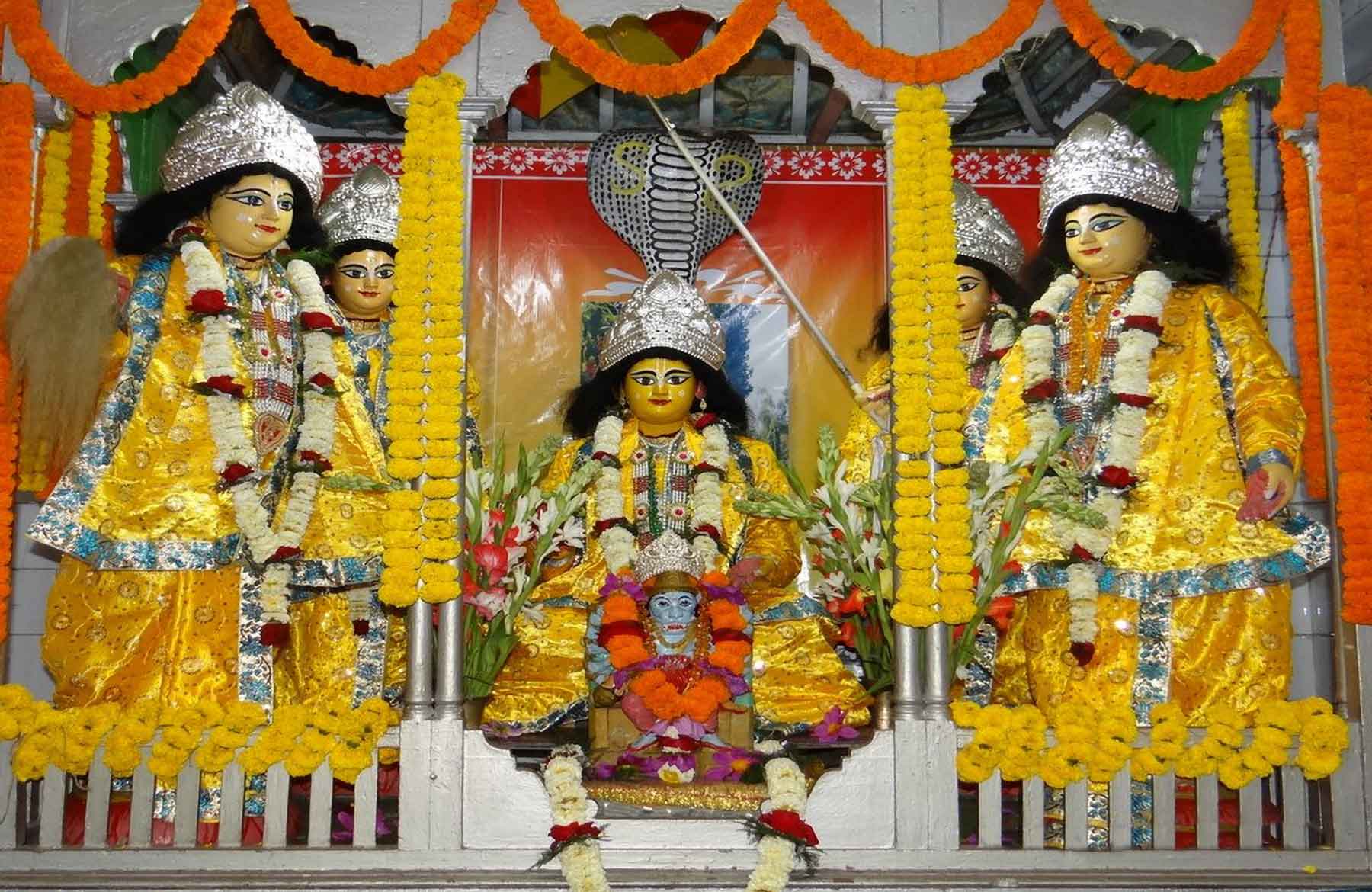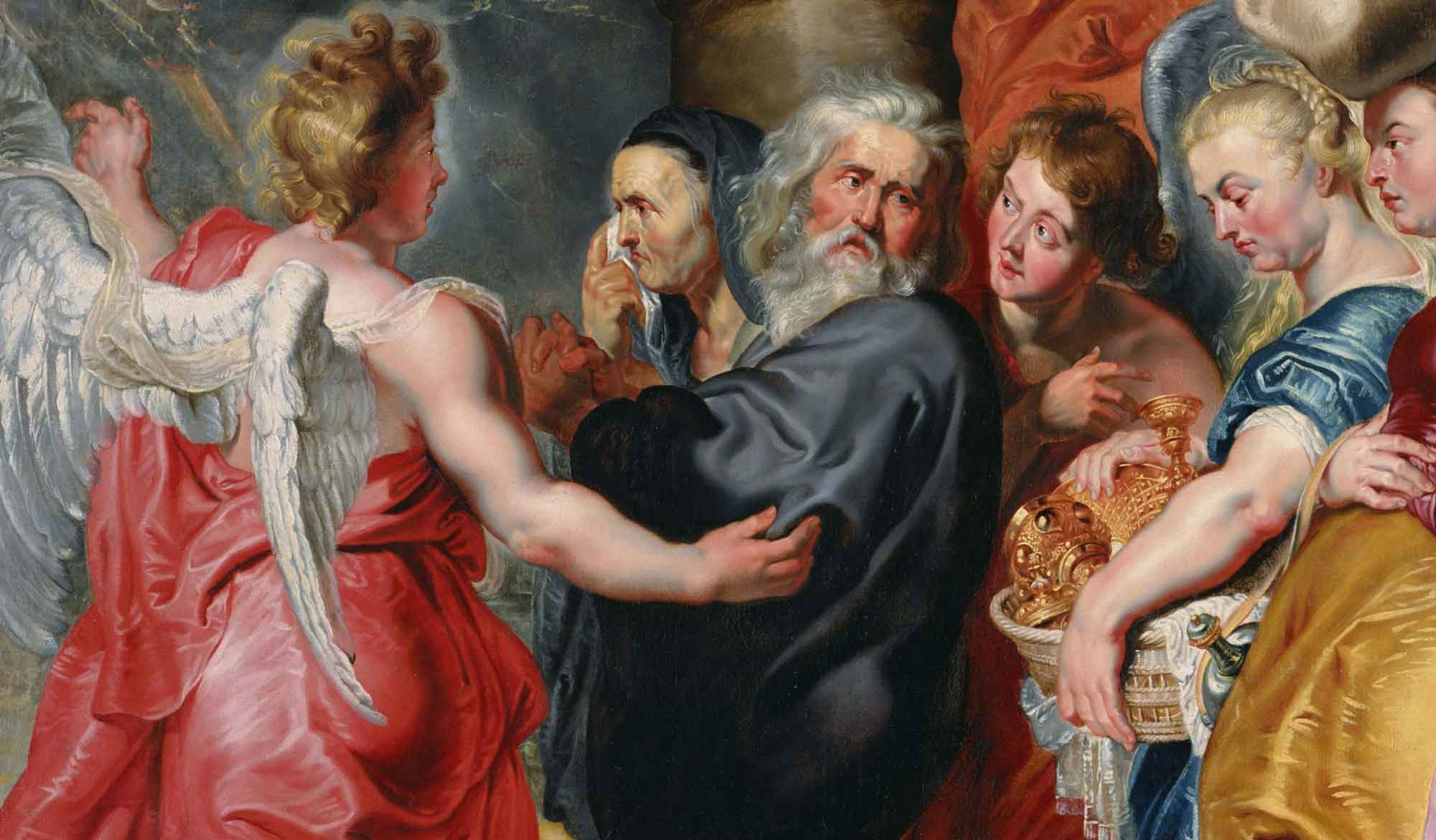Overview
Śuddha Vaiṣṇava Paricaya (Recognising a Pure Vaiṣṇava) was first published in Sajjana Toṣaṇī, Vol.1 in 1881. In this article, Śrīla Bhaktivinoda Ṭhākura deliberates upon pure Vaiṣṇava dharma in order to explain some of the characteristics of a pure devotee. He also discusses the various cults that arose after Mahāprabhu's disappearance that claim to be Vaiṣṇavas.
(translated by Swami B.V. Giri)
Many people show great respect simply upon hearing the word ‘Vaiṣṇava’, and upon receiving the caranāmṛta or food-remnants of a Vaiṣṇava, they feel most satisfied. On the other hand, some persons show extreme hatred upon hearing the word ‘Vaiṣṇava.’ They say that Vaiṣṇavas are extremely autocratic and oppressive, therefore for the sake of preserving society, it is one’s duty to reject their association. It is obligatory to explore the root cause of these two views concerning Vaiṣṇavas.
Those that lead their lives honouring the bliss of bhagavat–bhakti rather than all the pleasures of worldly life are known as Vaiṣṇavas. Despite the presence of the three modes of nature, sattva, rajah and tama, they are constantly searching for the indescribable quality of viśuddha-sattva. Therefore the nature of Vaiṣṇavas is nirguṇa (beyond the modes of material nature) and aprākṛta (transcendental). Is it any wonder that the Vaiṣṇavas will show special affection for those who, after discussing all the virtues of material nature, consider the mundane world to be utterly detestable? Those persons affected by those material qualities, respect those modes, while those beyond them do not. On the other hand, those who consider mundane opinions or sensual happiness to be the ultimate pleasure cannot hope to appreciate the efforts of the Vaiṣṇavas that are beyond the modes of nature. Rather, they take refuge in a mood which is distinctly opposed to the Vaiṣṇavas, and are fond of performing activities that cultivate that instinct. These kinds of futile attempts are very natural for those persons who are averse.
Although this type of asurika person can be described as an enemy of Vaiṣṇavas, another reason for disrespecting pure Vaisnavas is seen. That is the cause of their ignorance of vaiṣṇava-tattva. In all religions, the presence of dharmadhvajīs (religious hypocrites) and cheaters has been observed. Therefore many swindlers introduce themselves as Vaiṣṇavas. Listening to them and seeing their character, many kind-hearted people also lose faith in Vaiṣṇava dharma. Yet if they had done a little research, they would not have become disgusted with religion and religious persons by seeing the faults of such dharmadhvajīs. Why should religion be guilty of cheating? Due to the faults of cheaters, why should true sādhus be condemned?
When we hear the condemnation of Vaiṣṇava dharma in public, our hearts are broken. Vaiṣṇava dharma is the absolute wealth of our life. How can we tolerate such humiliation? In order to establish the greatness of the saintly devotees, we must set out to remove such faults.
A Vaiṣṇava is a person who is extremely merciful to all jīvas, without pāpa, devoid of envy, and a devotee of Bhagavān. He always has distaste for the world. It is not that he does no worldly activities, but he does all his duties to maintain his body as a man without any attachment. Affection towards Bhagavān is the guide and cause of all his work. When he is engaged in the world, he seems like he is attached, yet his mood is indifferent since he only relishes spiritual bliss. His character is generous and pure. His tendency for pure bhakti is his active profession. He does not act by observing predetermined rules. On his journey from this world to Vaikuṇṭha, when he arrives there, Bhakti Devī gives him all satisfaction. He does not seek any remedy through karma or jñāna. Ultimately, nothing inauspicious happens to him. Vaiṣṇavas are divided into two categories. Some are vaidhī (following the rules of śāstra) and some are anurāgī (cultivating spontaneous attachment). It is not that vaidhī Vaiṣṇavas are devoid of any anurāga (affection). There is plenty of anurāga, yet their disposition is centred around rules and regulations. The anurāgī Vaiṣṇava is not devoid of rules, but he leads his life making anurāga the master of all rules and engages in sādhana-bhakti.
In Bhārata, the ācāryas have said that there are four Vaiṣṇava sampradāyas. In Bengal, amongst these four sampradāyas, only one branch of the Mādhvī sampradāya is visible. There is no sign of the other three sampradāyas. Mahāprabhu Śrī Śrī Caitanyadeva descended to Navadvīpa-dhāma and propagated that Vaiṣnava dharma, which is generally called the Gauḍīya branch of Madhva’s philosophy. Śrī Mahāprabhu Himself did not propagate His philosophy by writing any book. Mahāprabhu’s own words have been written in all the worhippable texts initiated by the recipients of His mercy, namely Śrī Rūpa, Sanātana, Gopāla Bhaṭṭa, Jīva, and the two Raghunātha Gosvāmīs. The philosophy drawn from reading all these books such as Caitanya-caritāmṛta and the Govinda-bhāṣya etc. is what is known to be Mahāprabhu Caitanyadeva’s doctrine. All the sādhus, gosvāmīs, mahantas and bābājīs of Śrī Śrīkṣetra-maṇḍala, Śrī Śrī Navadvīpa-maṇḍala and Śrī Śrī Vraja-maṇḍala are preachers of that philosophy. Generally, what they teach based upon the aforementioned texts is pure Vaiṣṇava philosophy, and those that adopt that philosophy are pure Vaiṣṇavas.
There are some sampradāyas that are completely avaiṣṇava (non-Vaiṣṇava); yet persons in those sampradāyas call themselves Vaiṣṇavas and do a great disservice to pure Vaiṣṇavas. Among those communities, the Bāula, Neḍā, Saiṅ, Sahajiyā, Atibāḍī etc. are considered to be the main ones. All of these invoke Śrī Śrī Gaurāṅga and worship Rādhā-Kṛṣṇa of Vṛndāvana etc. However, the unfortunate thing is that all the teachings that they spread and whatever they do as divisions of sādhana are completely contrary to Vaiṣṇava dharma. The Bāulas and Daraveśa claim that at the time when Sanātana Gosvāmī wandered around in the form of a Daraveśa, he propagated those doctrines. * The Neḍās and Saiṅ claim that Śrī Vīracandra, the follower of Śrī Nityānanda, was their founder. The Sahajiyā Vaiṣṇavas established their own despicable doctrine by claiming that Śrī Rūpa Gosvāmī united with Mirābāi.
* Translators Note: While travelling to Prayāga to meet Mahāprabhu, Sanātana Gosvāmī looked like a Muslim mendicant with a long beard. The Bāulas and Daraveśa cults claims that while he was dressed like that, he propagated their teachings (an amalgamation of Sufi, Tāntrika and Vaiṣṇava ideologies).
It is very easy to see that all these are the complete opposite of pure Vaiṣṇava dharma. Initially, what is seen as the foundation of Vaiṣṇava dharma according to the dualistic philosophy, is the jīva’s eternal servitorship. If we do not acknowledge the existence of pure bhakti as ultimate liberation, then Advaitavāda is established and Vaiṣṇava dharma disappears. The aforementioned imaginary doctrines are generally Advaitavāda; this is because the Saiṅ, Bāula and Daraveśa all honour the ideology that the Lord is formless and without any qualities. If they achieve mukti, the jīvas will not attain kṛṣṇa-dāsya, but they will become Kṛṣṇa Himself. These persons have sung many such verses. There are many extremely worthless texts in Bengali and Sanskrit such as Nigama Kalpataru, Śaraṇtikā, Rāgavartma Candrikā etc. These persons compose them and then keep them secret. They do not allow the public to read them. With great difficulty, we have collected these books and read them. There is no doubt that the doctrine of the Bāulas and Daraveśa is Advaitavāda. Thus their beliefs are completely against the Vaiṣnavas. Their mode of worship is also totally avaiṣṇava. According to Vaiṣṇava philosophy, the tendency to associate with women is extremely unwholesome. As long as that instinct has not been given up in a sādhaka’s heart, there is nothing wrong in accepting a wife in marriage according to varṇāśrama-dharma for the purpose of living one’s life. By accepting a wife in marriage, a sādhaka is known as a gṛhī Vaiṣṇava (householder Vaiṣṇava). When bhakti becomes intense, the inclination for female association becomes easily diminished, and later by the gradual increase of vairāgya (renunciation), the Vaiṣṇava can move around without being connected to a household. Therefore, Vaiṣṇavas are divided into two categories – the householder and the guest.*
*Translators Note: The word for ‘guest’ used by Bhaktivinoda Ṭhākura is abhyāgata. The definition of this word is a guest or visitor, who is eligible to be honoured. In this case, it seems the Ṭhākura is talking about renunciates.
Such inferior Vaiṣṇavas as the Bāulas, Saīṅ, Daraveśa etc. often abandon their legal wives and have illicit connections with other women, referring to such wicked deeds as sādhana. In order to establish that wicked work amongst others, they preach that they practice worship with the help of women. They never satisfy their senses. Oh, what kind of Vaiṣṇava dharma is this? If it is Vaiṣṇava dharma, why would any modern inexperienced person respect it? All these cults have become a disgrace to Vaiṣṇava dharma. Seeing their behaviour, many inexperienced, simple and kind-hearted people, also show disrespect towards Vaiṣṇava dharma.
Actually, Vaiṣṇava dharma is very pure and auspicious. It is completely faultless. It is the culmination of all religions that have been propagated in the world. If anyone doubts this, they can ask questions and I will remove their doubts. Can there be any lack of logic in a dharma which has been established as the treasure of one’s heart by enlightened people such as Śrī Jīva Gosvāmī, Śrī Rāmānuja Svāmī etc? Can there be any kind of disturbance in a dharma that great scholars like Śrī Rūpa and Sanātana have attained supreme bliss by completely engaging their bodies and speech in? There is no doubt that one who has observed that pure dharma with an impartial eye, will follow in the footsteps of Śrī Śrī Caitanyadeva, considering one’s family, wealth, class, knowledge, worldly prestige, physical pleasure and country to be insignificant. Those whose hearts are hardened by the friction of arguments, who abandon kindness to the jīvas for the sake of selfishness, who are not able to realise the essence of transcendental prema, and who refrain from consuming the divine wine of bhakti, but disturb their minds with useless intoxicants – Oh! Such unfortunate persons will simply be deprived of pure, sweet prema.













